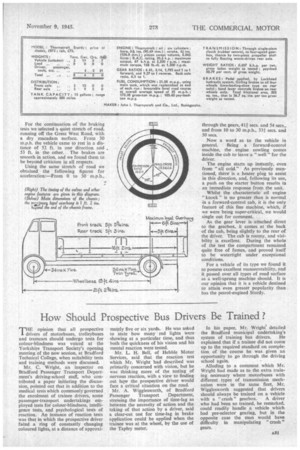How Should Prospective Bus Drivers Be Trained ?
Page 41

If you've noticed an error in this article please click here to report it so we can fix it.
T" Opinion that all prospective drivers of motorbuses, trolleybuses and tramcars should undergo tests for colour-blindness was voiced at the Yorkshire Transport Society's opening meeting of the new session, at Bradford Technical College, when suitability tests and training methods were discussed.
Mr. C. Wright, an inspector on Bradford Passenger Transport Department's driving-school staff, who contributed a paper initiating the discussion, pointed out that in addition to the medical tests which commonly governed the enrolment of trainee drivers, some passenger-transport undertakings employed tests for colour-blindness, intelligence tests, and psychological tests of reaction. An instance of reaction tests was that in which the prospective driver faeed a ring of constantly changing coloured lights, at a distance of approxi
mately five or six yards. He was astmcl to state how many red lights were• showing at a particular time, and thus both the quickness of his vision and his mental reaction were tested.
Mr. L. H. Bell, of Hebble Motor Services, said that the reaction test which Mr. Wright had described was primarily concerned with vision, but he was thinking more of the testing of nervous reaction, with a view to finding out hqw the prospective driver would face a critical situation on the road. Mr. A. Wigglesworth, of Bradford Passenger Transport Department, stressing the importance of time-lag as between the necessity of action and the taking of that action by a driver, said a clear-cut test for time-lag in brake application could be applied when the trainee was at the wheel, by the use of the Tapley meter. In his paper, Mr. Wright' detailed the Bradford municipal undertaking's
system of training bus drivers. He explained that if a trainee did not come up to the required standard on completion of the course he was given an opportunity to go through the driving school again.
Alluding to a comment which Mr. Wright had made as to the extra training necessary where motorbuses with different types of transmission mechanism were in the same fleet, Mr. Wigglesworth suggested that drivers should always be trained on a vehicle with a " crash " gearbox. A driver who had been so trained, he remarked, could readily handle a vehicle which had pro-selector gearing, but in the opposite case the man would have difficulty in manipulating "crash" gears.




























































